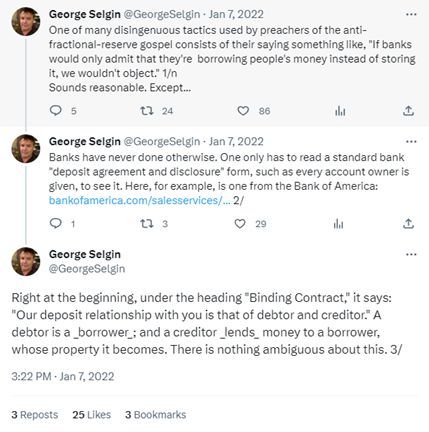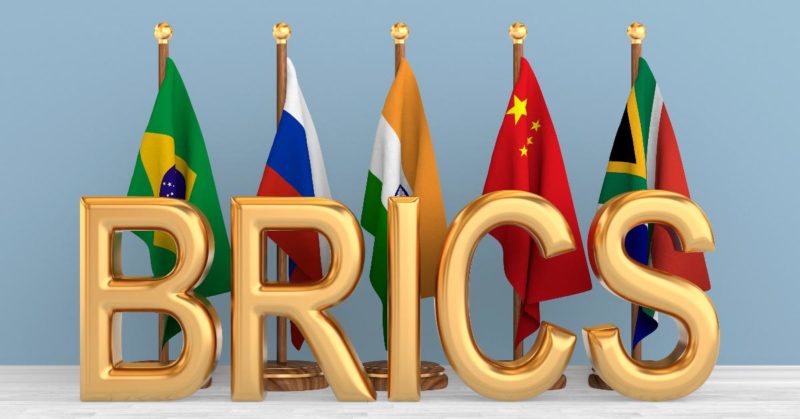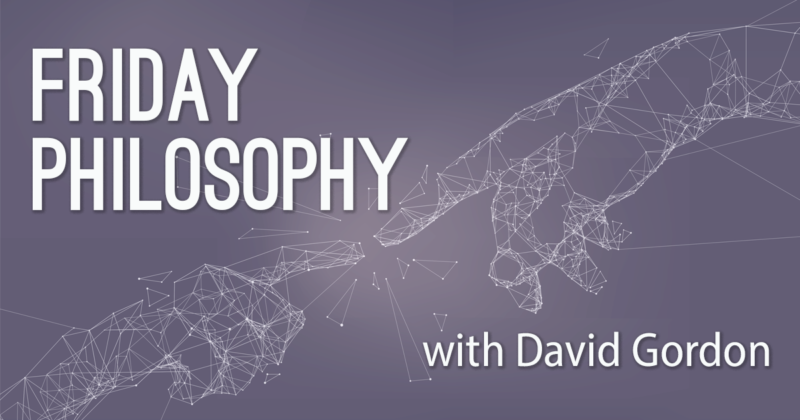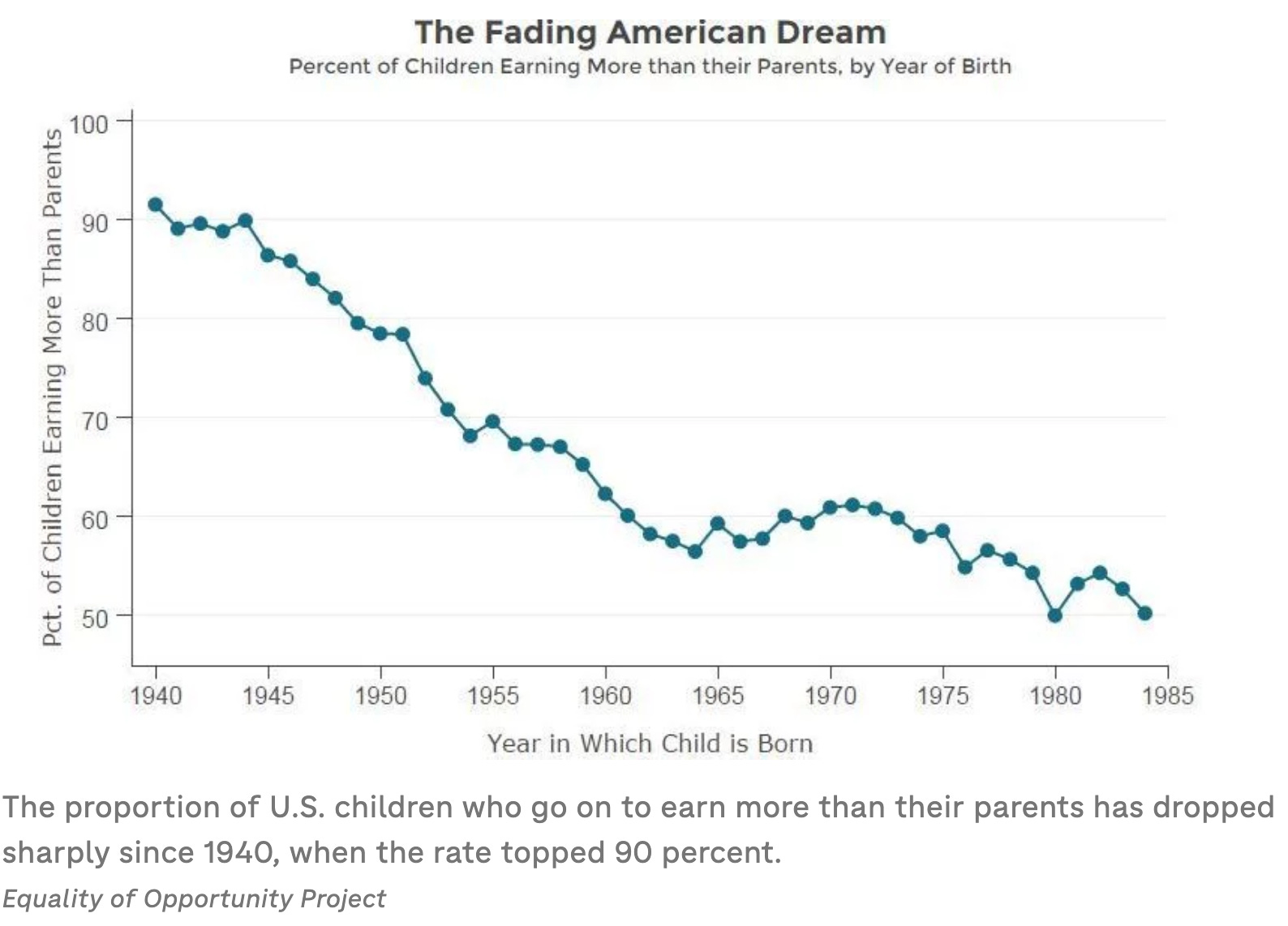Category Archive: 6b.) Mises.org
Mises versus Hayek on the Future of Civilization
While F.A. Hayek is known for his term “spontaneous order,” Mises saw institutional development as coming from growth in human understanding of things.
Original Article: Mises versus Hayek on the Future of Civilization
Read More »
Read More »
Public Goods Viewed through Entrepreneurship
Public goods, in mainstream economic theory, are goods that are nonrivalrous, where one person using a good does not preclude anyone else’s capacity to do the same, and nonexcludable, where owners of the public goods are generally unable to restrict anyone’s access to the good. Commonly touted examples include public lighting, like streetlights, radio, firework shows, military defenses, and flood defenses.
To the mainstream, public goods present an...
Read More »
Read More »
States Are Dying from Corruption and the Exponential
The state is held together by violence and nothing else. There is no such thing as "the social contract." But even violence cannot make a state last past its time, as we saw with the USSR.
Original Article: States Are Dying from Corruption and the Exponential
Read More »
Read More »
How Is the Fed Insolvent and Why Should We Care?
Alex Pollock has decades of experience in financial markets, including a position as President of the Federal Home Loan Bank of Chicago. He explains to Bob the mechanics of the Fed's current insolvency and its implications for ordinary Americans.
Join us in Fort Myers on November 4 to cut through the campaign talking points and offer an uncompromising look at what is coming next. Use Code "FL2023" for $10 of-f admission: Mises.org/FL23...
Read More »
Read More »
Statism Stands against Free Trade and Free Association
Free trade has its enemies on the left and the right. However, despite the supposed “sophistication” of their antitrade arguments, when we break them down, those arguments really are sophistry.
Original Article: Statism Stands against Free Trade and Free Association
Read More »
Read More »
Physician Burnout: Another Consequence of Medical Socialism
Obamacare's forced electronic medical recordkeeping is denying patients the care they need.
Original Article: Physician Burnout: Another Consequence of Medical Socialism
Read More »
Read More »
The Data Shutdown—Smokescreen?
This episode examines the impending Government Shutdown, which will suspend new releases of the government's "vital" economic statistics. How will the "Data Dependent" Fed manage its policy behind the cloak of missing data? Mark suggests it's best to consider that the Fed is playing its typical confidence game.
Be sure to follow Minor Issues at Mises.org/MinorIssues.
Read More »
Read More »
Last Day to Double Your Gift
The Mises Institute sends a big THANK YOU to everyone who already donated to our Fall Campaign this week.
Your support helps us continue to make the sound economic principles of Mises, Rothbard, Hazlitt, and Hayek free to the world at a time when they are needed more than ever.
If you haven’t had time to donate, please do so today. Hunter Lewis, a generous donor and author of numerous books, is passionate about educating a future generation of...
Read More »
Read More »
Will Dollarization Work in Argentina?
In Argentina, the libertarian presidential candidate Javier Milei made headlines when he came in first in the primary on August 13. His economic program calls for a strong reduction in government spending and the role of government in general and would, if implemented, greatly improve the conditions of economic life in Argentina.
There is, however, one weak point—namely, his proposed monetary reform. Faced with high inflation rates and a...
Read More »
Read More »
Is the Money in Your Checking Account Yours or the Bank’s?
When Silicon Valley Bank and other banks failed earlier this year, the debate over the sustainability of fractional reserve banking resurfaced. Under fractional reserve banking, banks keep only a fraction of customers’ deposits in reserve. The difference is bank credit, such as government debt, mortgages, business loans, and many other kinds of loans. This practice leaves the bank open to a run, in which panicky depositors attempt to withdraw their...
Read More »
Read More »
Totalitarian Ideals and Not Living by Lies
More than forty years ago, Aleksandr Solzhenitsyn urged his fellow Russians “not to live by lies.” In our politicized age, his words ring truer than ever.
Original Article: Totalitarian Ideals and Not Living by Lies
Read More »
Read More »
Assessing the BRICS Expansion: Debunking Expectations
At the conclusion of the BRICS summit in Johannesburg on August 24, 2023, it was announced that the five-country grouping of Brazil, Russia, India, China, and South Africa, had invited six more countries to join: Saudi Arabia, the United Arab Emirates, Iran, Egypt, Ethiopia, and Argentina. The new memberships, which will take effect in January 2024, were called “historic” by Chinese leader Xi Jinping, while Vladimir Putin, unable to travel due to...
Read More »
Read More »
Living Libertarian: Brief Biographies
Libertarian Autobiographies: Moving toward Freedom in Today’s Worldedited by Jo Ann Cavallo and Walter E. BlockPalgrave Macmillan, 2023; xx + 533 pp.
Jo Ann Cavallo and Walter Block have done those interested in libertarianism a great service, but they have set the reviewer of their book an impossible task. They have gathered together eighty short accounts in which well-known libertarians describe their various paths toward their political and...
Read More »
Read More »
The Problem With “Classical Liberals”
On this episode of Radio Rothbard, Ryan McMaken and Tho Bishop take a look at "classical liberalism," a term that has come to mean a variety of different things in recent years. What is the history of classical liberalism? Is classical liberalism distinct from radical libertarianism? Is it ultimately a moderate form of leftism? Ryan and Tho address these questions and more during the Mises Institute's Fall Fundraising Campaign....
Read More »
Read More »
The Fed Holds the Fed Funds Rate Steady—Because it Doesn’t Know What Else To Do
If we read between the lines, it is apparent that the Fed is hoping that price inflation will fall to politically acceptable levels without any additional tightening, and without a recession. But "hope" is all the Fed has.
Original Article: The Fed Holds the Fed Funds Rate Steady—Because it Doesn't Know What Else To Do
Read More »
Read More »
The Partnership from Hell
But once a commodity is established as a money on the market, no more money at all is needed.
—Murray Rothbard, Taking Money Back
The Fed’s distinguishing characteristic is its grant of privilege to buy assets with money it doesn’t have. No other person or institution can legally do this; those that tried would be indicted for counterfeiting.
At the very least you might think this would raise eyebrows, but it doesn’t except in fringe quarters. It...
Read More »
Read More »
Three Cheers for Mises
Today marks the birthday of Ludwig von Mises, and day 5 of our annual Fall Campaign.
The intellectual achievements of Ludwig von Mises make him one of the greatest minds in human history. His contributions to Austrian economics inspired new generations of scholars, from Murray Rothbard and F.A. Hayek to current leaders like Joe Salerno, Ron Paul, and Patrick Newman. He is the most powerful intellectual opponent to socialism the world has ever...
Read More »
Read More »
Why Stabilization Policy is Destabilizing
The call for "price stabilization" was part of the recent Republican debate. Despite its attractive appearance, having the Fed try to "stabilize prices" is a very bad idea.
Original Article: Why Stabilization Policy is Destabilizing
Read More »
Read More »
Stop Trying to “Contain” China in Southeast Asia
It was a laughable moment when President Joe Biden said at a press conference during his visit to Hanoi that the United States wasn’t seeking to contain China. Despite efforts by the Biden administration to send its top officials to quell any suspicion that Washington, DC, was trying to contain China, Beijing has realized that the efforts were merely a cover-up. By restricting access to chips and their manufacturing components as well as spending...
Read More »
Read More »
The State versus Entrepreneurs: Prosperity Always Loses
Governments prioritize economic growth as a national policy to win elections. Economic growth is a concern for all citizens because increasing economic growth improves living standards. There are more opportunities for self-advancement and leisure in a booming economy, so people endorse politicians who demonstrate that they know how to transform a sluggish economy into a booming one. Voters usually benefit from government policies when they...
Read More »
Read More »





























